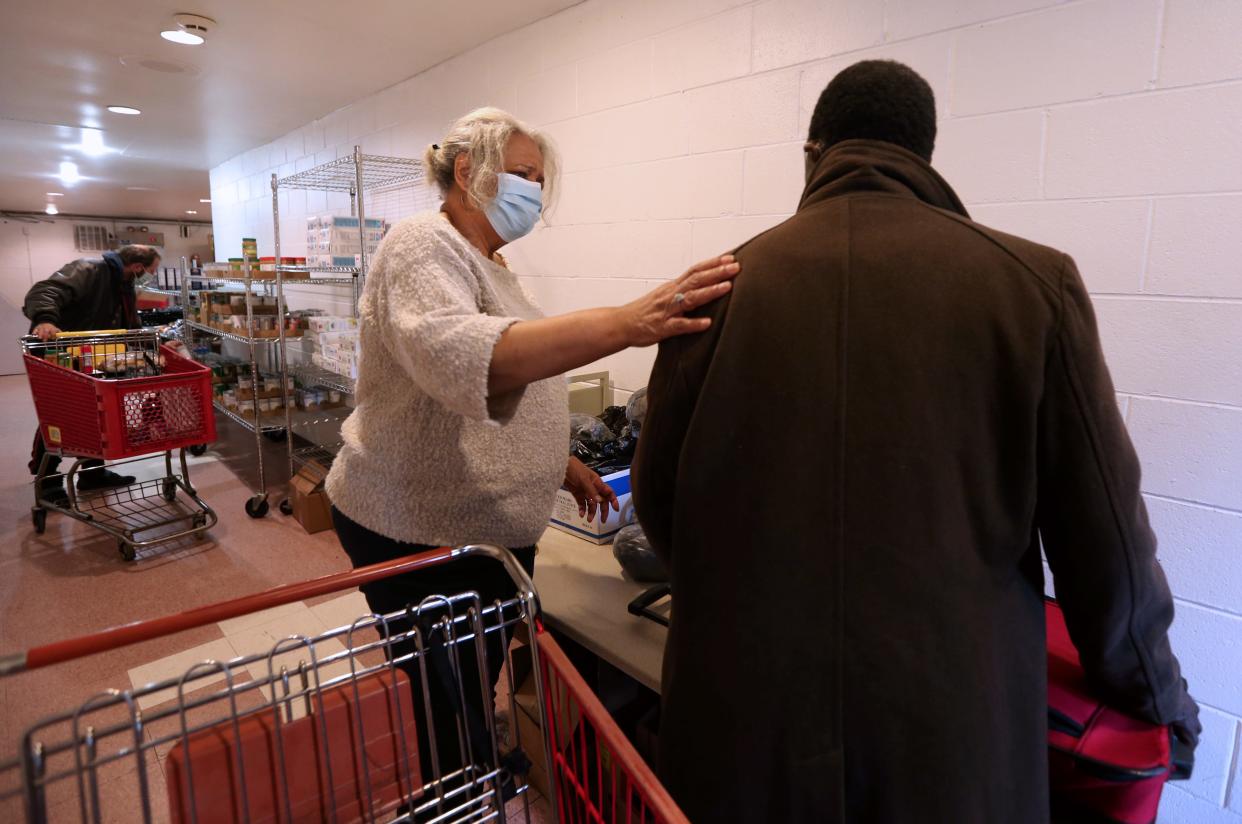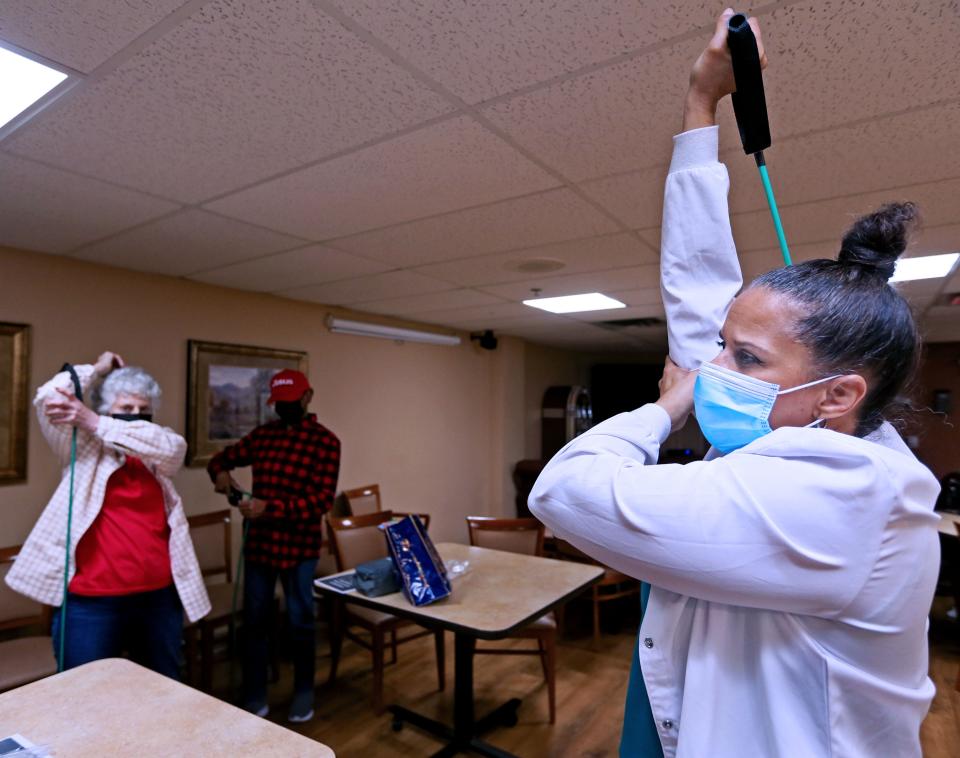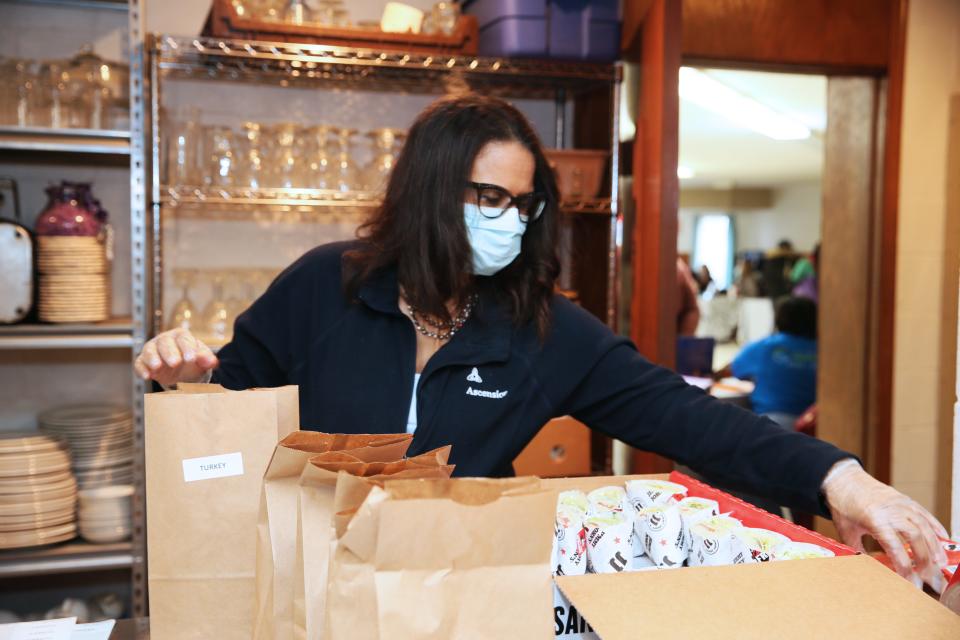Parish nurses provide an important connection to communities in need, but few of them remain

Parish nurse Julia Means was at Clinton Rose Senior Center in Milwaukee when a resident approached her about a neighbor who couldn’t get out of bed.
Means, a nurse with Ascension Wisconsin, went to visit her.
The neighbor, an older woman, hadn’t gotten up for two weeks. She couldn’t take care of herself. She was so weak that she left her front door open because she couldn’t answer it.
“I don’t know what to do,” the woman’s son told Means.
Means persuaded her to go to the hospital. After some tests, the doctors immediately knew what was wrong.
The woman had stopped taking her thyroid medication, a drug that can cost pennies a day.
A week later, Means went to visit the woman at the hospital. She had a smile on her face and was walking up and down the halls. She told Means she couldn’t believe it was all because of not taking a pill.
The woman — like many others — is an example of someone who didn’t understand her medical condition. An estimated 50% of people do not take medications as prescribed.
Means works to ensure that doesn’t happen.
Health care brought to the home
Parish nursing moves beyond the four walls of a hospital and brings health care to where people live. It works to improve health and lessen the gap between those with the lowest incomes and those with some financial security.
Means has been at the forefront of making health care more accessible in Milwaukee for more than 25 years. In 1996, when parish nursing was relatively new, Means became the first parish nurse for what is now Ascension Wisconsin.
A parish nurse is a registered nurse who works in a community and within the pastoral department of a church. Parish nursing started in the 1980s and was officially recognized in 1998 by the American Nursing Association.
Means began at a church on Martin Luther King Drive in a Milwaukee neighborhood with one of the highest poverty rates in Wisconsin.
It was considered a hot spot for violence, Means said. Yet she never felt in danger.
She would park her car and walk for blocks, starting at Ebenezer Church of God in Christ. From there she’d walk to Clinton Rose Senior Center, a St. Vincent de Paul resource center, Solomon Community Temple and Dr. Martin Luther King Jr. Elementary School.
Word about her work spread. The neighbors came to recognize her, and being a nurse gave her a certain credibility. Families Means met decades ago, kids she saw grow up, still remember her.
“They never knew my name,” Means said. “It was just ‘hey nurse.’”

What is parish nursing?
Parish nursing was once a growing specialty. Marquette University had a program to train parish nurses. Several Milwaukee hospitals used to have parish nurses. Means, along with her colleague, Brenda Buchanan, are now the only two that work for a health system in Milwaukee.
A type of community nursing, these nurses are an unconventional part of health care and the precursor of sorts to community health workers.
Their work addresses the social and economic conditions — income, education, housing, transportation, access to healthy food — that can often affect health more than access to health care itself.
They build relationships and establish trust with the people they serve, and at times are an advocate for patients. They are often considered family.
“All you have to do is solve one problem and you get this reputation of being a miracle worker,” Means said.
Means and Buchanan recommend and contact physicians for patients, and sometimes accompany them to appointments. They work to improve health literacy, educating people about nutrition, blood pressure, cholesterol, diabetes, dementia and more. They do weekly segments on WNOV, a local radio station that focuses on Milwaukee’s Black community.
They help run a food pantry at the Ascension Ebenezer Health Resource Center twice a week. They help coordinate the “Blanket of Love'' program, which provides prenatal and parenting education. They care for people who are homeless and those struggling with addiction at Meta House, a rehabilitation center.
Means helped one woman shop for her first house. Buchanan has taught exercise classes. During the first wave of the COVID-19 pandemic, they vaccinated thousands of people.
Jonathan Saffold, a pastor at Ebenezer, said the pair are like octopuses — they do everything, just with fewer arms.
“Their work is never done,” he said. “They find a wound and heal it, they find a need and fill it.”
Helping those in need during times of crisis
Buchanan started her work at Three Holy Women.
She remembers meeting a patient at a free clinic, who was addicted to drugs.
He had once been a wealthy businessman, but after a celebratory trip to Las Vegas, he had a mental breakdown. He ended up homeless. He lost everything — his business, his money, his family.
Buchanan helped him in his recovery. He eventually got an apartment and a job.
Means can recall a young man who was mentally disabled. He was living in a drug house. His mother told her that he was being abused and his cousin was taking his monthly disability check.
Means got in her car and drove there. She had no plan, but she was angry. She prayed.
While praying, a fight broke out in the house and it spilled into the yard. The man recognized her car, and in the midst of the confusion, snuck into the backseat. Means drove off.

Care includes a holistic focus
Parish nursing does not stop at treatment of the body – it incorporates care for the spirit. Other nurses look at physical symptoms alone; parish nursing is guided by a holistic view of health. They dig deeper into how spiritual, emotional and mental well-being can affect their patients.
Buchanan estimates that 70% of health care visits are rooted in these issues.
When people are depressed and hopeless, when they are spiritually distraught and don’t know where they fit in the world, it’s hard to treat issues like diabetes. If a person is stressed, blood pressure and blood sugar will spike.
“Those things are always gonna be out of control,” Buchanan said.
This is why physicians and health systems — to varying degrees — are beginning to focus on the underlying social and economic conditions that affect health.
Pamela Banks received an urgent call in July 2020. Her mother was taken to an emergency department in Milwaukee for complications from her treatment for kidney cancer. The call she received wasn’t from the hospital. It was from Means, who knew Banks’ mother through her work at Ebenezer.
A year later, Banks spent 30 days in the hospital following a bout of sepsis, major surgery and her blood pressure peaking at 190 over 90. Means and Buchanan stood by her side during the recovery.
“Every church, every community, should have a parish nurse,” Banks said.
Not going to the doctor becomes a learned behavior, she said.
Buchanan and Means have found this to be true.
“Often people don’t seek health care because they don’t want to go to a hospital — a place where no one looks like them or has the time to sit down and actually explain things to them,” Buchanan said.
Big health systems often viewed skeptically
Big health systems can lack credibility in the eyes of the Black community and other minorities.
Painful memories of segregated hospitals and infamous incidents like the Tuskegee syphilis study linger.
The decades-long study, performed by the U.S. Public Health Service and the Centers for Disease Control and Prevention, observed the long-term effects of syphilis in hundreds of impoverished Black men between 1932 and 1972. Researchers withheld treatment for the disease from these men when it became available in the 1940s.
COVID-19 made clear this wariness persists.
“Frankly, it’s not just history,” Buchanan said. “It’s how they’re treated nowadays.”
Combating staunchly held notions about health care and improving health literacy is much of what parish nurses do, she said.
“If you don’t know what your doctor is talking about,” Buchanan said, “how can you take part in your care?”
Some patients will call Buchanan or Means after an appointment because they didn’t understand what the clinician told them.
“I’ve had people that have had surgeries that’s changed their lives forever,” Buchanan said. “They didn’t understand what they went through.”
Buchanan told a story of a woman who had a hysterectomy – the removal of the uterus. It was only when she struggled to have children that she discovered the surgery’s ramifications.
A 15-minute visit every six months – or longer – often isn’t enough for a patient to build trust or ensure that they understand their diagnosis and treatment, Means said.
What complicates it more is the fear of asking questions, partly because patients don’t want to appear stupid and partly because of the brevity of appointments.
Active listening to the needs of patients
Buchanan and Means work to put patients at ease. Active listening and authenticity are at the forefront of their approach.
“(Patients) are more comfortable telling us what’s wrong with them or letting us know they’re not doing what the doctor told them to do,” Means said. “They know we’re not going to judge them or blame them.”
Means and Buchanan are a “bridge” between Ascension and poorer neighborhoods. When Ascension has poor outcomes in treating diseases, like diabetes and hypertension in certain populations, it turns to its parish nurses.
“They know we have an impact on the patients,” Buchanan said.
Being connected to churches and rooted in the community makes all the difference.
At Ebenezer, Saffold often witnesses Means and Buchanan’s impact firsthand.
When they speak, he said, people listen.
It's not by chance. Their demonstrated concern speaks volumes to the community.
“People don’t care how much you know until they know how much you care,” Saffold said. “They do their work heartily unto the Lord.”
Broader impact can be difficult to see
Means and Buchanan love their jobs, but it has brought them tears, too. They know they’re helping those they reach. Patients are living longer and healthier lives. But it’s hard to see progress on a larger scale.
“In some ways, it’s worse,” Buchanan said.
They help keep people out of emergency departments and hospitals, but their reach is limited.
“That’s discouraging,” Means said.
Milwaukee is the most violent Means has ever seen – she called it “devastating.” In 2022, the city broke its record for homicides for the third straight year.
Birth outcomes in Milwaukee are some of the worst in the country, and the infant mortality rate in the poorest neighborhoods is comparable to that in developing countries.
Given the longstanding and widespread problems in Milwaukee’s poorest neighborhoods — and given the increased focus on how underlying social and economic conditions affect health — why aren’t there more parish nurses?
One reason: money.
Health insurance does not cover the services that parish nurses provide. Buchanan said that when health systems are making cuts, justifying the cost of employing parish nurses is difficult, because their successes can be hard to measure.
In recent decades, health systems have also focused on expanding in affluent suburbs and on providing costly services that generate the most revenue.
With the exception of Children’s Wisconsin, health systems have few if any clinics in Milwaukee’s poorest neighborhoods. Care instead is largely provided by community health centers.
It wasn’t always that way, Means said. Milwaukee once had small clinics throughout the city and people knew their doctors.
“We used to have tentacles in our community, where people went and got health care,” she said. “That’s all gone now.”
But Means sees a way forward. It’s more “boots on the ground” and more places where people can get care, such as simply getting their blood pressure checked, to help keep them out of the hospital.
Milwaukee also needs safer neighborhoods where people can exercise and better access to healthy, affordable food.
We are only as healthy as the community that surrounds us, she said.
“If we want our community to be healthy, we gotta put some money out there,” Buchanan said. “And I don’t just mean Ascension.”
Alexa Jurado reported this story while attending Marquette University and working as a research assistant to Journal Sentinel reporter Guy Boulton. Boulton spent the 2021-22 academic year as an O'Brien Fellow in Public Service Journalism at Marquette University examining the social determinants of health. Angela Peterson is a photojournalist with the Journal Sentinel.
This article originally appeared on Milwaukee Journal Sentinel: Parish nurses give in-home care, but few remain in Milwaukee

